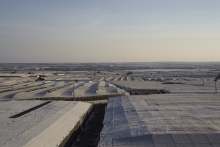The multi-million euro vegetable industry in Almeria relies on undocumented workers like Omar, who are employed without contracts or legal protection. Companies in the Almeria region are thought to supply all major UK supermarkets in the UK.
Thousands in Nijar are forced to live in overcrowded shanty towns, made of pallets, cardboard and plastic from the greenhouses, because they cannot legally rent accommodation without documentation.
In July 2020, Ethical Consumer worked with local organisations to launch a solidarity Crowdfunder, to improve conditions in the shanty towns during coronavirus. Much of the £26,000 funding went to settlements in Nijar, including that which was burnt down in the recent fire.
The blaze which started on Saturday night is believed to have been caused by a fuel cylinder, but José Cuevas, from the agricultural union SOC-SAT, says that “there’s been suspicion for a long time that the fires are deliberately started.”
Two people are currently being treated in hospital for burns.
Multiple fires in Almeria and Huelva
Fires in the shanty towns are not uncommon. José Cuevas from the agricultural trade union SOC-SAT says that this fire is the fourth in Almeria within 18 months. Last December, 200 people also lost their homes during a fire in Nijar. Thousands in Huelva, where fruit pickers live in similar conditions, have similarly lost their homes due to fires in recent years.
Residents live knowing they are at permanent risk of losing everything. “Many workers carry their papers everywhere they go, in case the shacks burn, not to lose their documentation,” José Antonio, who works for SAT Union in Huelva, told us.
Migrants face racism and hostility from some locals. In Almeria, Vox, Spain’s nationalist party, has been elected to local government, and in the past, landowners and local police forces have prevented workers resettling after the fires, without providing options for relocation.
Cuevas told Ethical Consumer, “there’s been an atmosphere of harassment lately in the particular settlement [where the fire occurred]. The neighbours, the people who have the land next door, have come along with diggers. They’ve dug up water pipes and electrical cables. The municipal police have also been harassing people…. People’s dignity is absolutely trampled upon.”
The local government has so far only rehoused three families with children. Its official records fail to mention the number impacted or the name of the settlement where the fire took place. The mayor has so far refused to open the city’s Congress Center, which was designed to host those affected in the event of an emergency.
“Our house is burning… more than 500 people will sleep outside tonight… Thank God nobody died. We are in desolation,” local worker Omar said in a video shared by the BBC.
What should supermarkets do?
UK supermarkets rely on undocumented workers like Omar to supply tomatoes, lettuce and other salad vegetables.
Systemic exploitation of these workers has forced them to live in unsafe conditions. Growing companies in Almeria profit from the undocumented status of many of their workers, who are forced to accept casual work, no contracts and illegal conditions. Wages can be illegally low, as little as €32 for an eight-hour day.
SOC-SAT Union says that employers also often illegally charge undocumented migrants up to up to €6000 for a year’s contract, which is required to apply for residency. The ‘cost’ is deducted from wages. Migrants must also live in Spain for three years before they can apply for residency, leaving them in limbo despite providing vital labour for the country’s agricultural sector.
Even documented workers often have to stay in the shanty towns because they cannot afford rented accommodation or face a chronic shortage of housing. An estimated 30% of the total number of workers currently live without electricity or running water.
Supermarkets must address these abuses in their supply chains. We are calling on them to identify their suppliers in Almeria and Huelva and implement proper checks on the farms that supply them.






